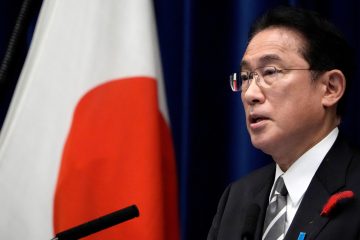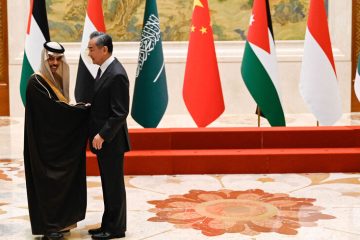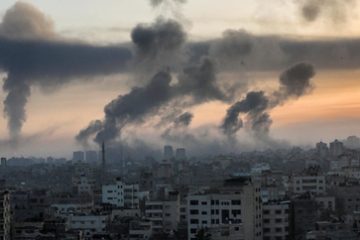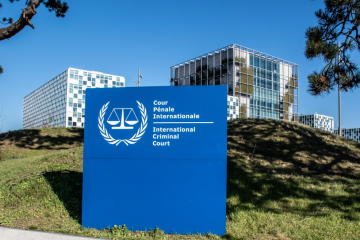
Does Japan Expect Sanctions on Hamas to have Any Effect?
On 31 October, 2023, Japan imposed a collection of asset freezes on individuals and entities related to or supporting Hamas. The sanctions came after a surprise attack on Israel by Hamas on 7 October. Hamas launched thousands of rockets into Israel while also crossing the border and massacring Israeli civilians. It is estimated that 1,400 Israeli nationals and foreigners were killed in the attacks. In the following days, while Hamas continued its attacks, Israel scrambled to mobilize its military to counter the threat posed by Hamas in Gaza. Israel began its counteroffensive with a barrage of airstrikes, followed by a ground invasion of Gaza which has lasted for over six months. In the immediate aftermath of the attacks, Japan joined …

Chaos by Design: The Dehumanising Nature of US Aid Airdropped into Gaza
Since October 7, Israel has blocked most food, water, hygiene items, and medicine from entering Gaza. The government has denied access to aid agencies, security inspections have deliberately slowed the entry of trucks, communication blackouts have cut off internet and phone services to more than two million residents, and Israeli protesters have lined up to block humanitarian aid supplies. Moreover, the US, UK, and other donors suspended funding to UNRWA, the UN’s aid agency for Palestine, after Israel accused staff members of participating in the October 7 attacks and called for the organisation to be disbanded. Crucially, these accusations have not been proven. As a result, people in Gaza are starving. Sixteen children, and counting, have died of malnutrition, UN …

Israel’s Strategic Dilemma
Debate in Israel about the government’s strategy in the Gaza war is heating up. While a majority of Israelis still support the war in Gaza, a growing minority are questioning whether continuing the war against Hamas will bring greater security to Israel or stability to the region, arguing that the government’s military campaign will perpetuate a conflict damaging all parties – not least Israelis themselves. Benjamin Netanyahu’s failure to bring home the Israeli hostages has reinforced tensions and doubt among the public. But continuing the war suits the incumbent government, enabling them to remain in power. Paradoxically, it also suits Hamas. Only when a majority of Israelis themselves conclude that the current strategy puts at risk rather than guarantees their …

China on Israel-Palestine: Positioning Itself as an Empathetic Great Power?
Almost a week after Hamas launched a surprise attack on Israel on October 7, China’s foreign minister, Wang Yi, called for a global peace conference and a ceasefire. China’s messages can be boiled down to three main points: 1) condemning attacks on both Israeli and Palestinian civilians and the breaking of international law, 2) calling for dialogue between the warring sides, and 3) emphasising the necessity of a two-state solution. China’s messaging follows a similar pattern expressed after previous Israel-Palestine escalations, whereby Beijing refuses to take sides explicitly, urging restraint and promoting peace talks. Chinese-Palestinian & Chinese-Israeli relations: China’s ‘neutrality’ leans in support of Palestine, at least rhetorically. While insisting on both Israel and Palestine’s right to statehood, Wang Yi …

After Gaza: Prospects for a political solution to the conflict
Despite the appalling course of events since 7 October, the continuing fighting and the suffering of the bereaved and displaced in Israel and Gaza, people are beginning to ask where this will all end, how it will end, and even whether it will end? It is essential to address these questions now, because a lasting solution can only be found once people on both sides have some hope for the future The emergence of the two-state solution Since the 1917 Balfour Declaration declared support for a Jewish homeland in Palestine and fuelled the two growing national movements of Jews and the Palestinian Arabs, there have been only three possible solutions to the question of who lives in the land between …

Legal Activism or Ex-Post Justice?
Over Gaza, the international criminal justice system (ICJS), spearheaded by the International Criminal Court (ICC), must pick a trench: Does international criminal justice entail the active involvement in humanitarian relief and prevention in conflict zones? I call those who support this proposition, “legal activists”, for a lack of better terminology. Or might, in contrast, the sole objective of ICJS operations be the realisation of ex-post justice, as “purist” interpreters of international criminal justice usually espouse? This post argues that these two objectives are not mutually exclusive. Instead, I argue that a legal activist approach in situations of acute conflict facilitates ex-post justice in the long run. Gaza, War Crimes, Silence The ICC’s Chief Prosecutor’s Office has been investigating war crime allegations in …









